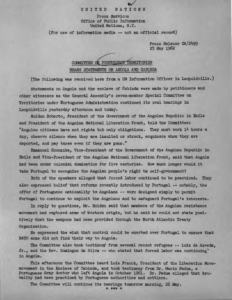How African Nationalists petitioned to the UN during Decolonization
Belle Benavente
May 3, 2022
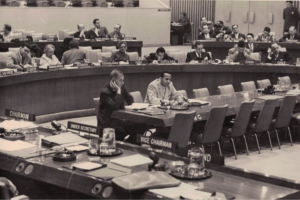
Getting to the UN
African revolutionaries often received funding from American or international organizations to travel to the UN. This included travel costs, accommodations, and support while petitioning at the UN. This photo shows Deputy President of the African National Congress, Oliver Tambo, holding Cora and Peter Weiss’s son. Tambo stayed at the Weiss’s home while petitioning the UN in 1963. Peter Weiss was the executive director of the Board of the American Committee on Africa. ACOA was particularly active in supporting Africans who were invited to petition the UN; often provided funds before and after trips, as well as organizing US tours for Africans.
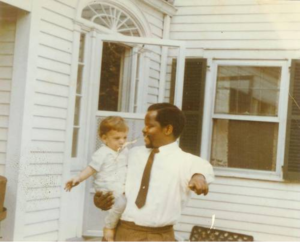
Image of Oliver Tambo: https://africanactivist.msu.edu/record/210-849-33285/
Who got invited?
Revolutionaries traveled to the UN to convey updates about the situations in countries during decolonization. Those who petitioned and traveled depended more on their leadership within movements and resources than ideology. However, because of the Cold War, it was unlikely that those who identified as communists were able to travel to the US and petition. This is specific to petitioning the UN in New York, as delegations and meetings involving the UN had more diverse ideologies in Africa. This picture shows Mfanafuthi Johnstone Makatini, representative of the African National Congress (ANC), making a statement before the Special Committee Against Apartheid. This hearing marked the 15th anniversary of the establishment of the Committee (1978). Also shown is Elizabeth Sibeko of the Pan Africanist Congress of Azania (PAC).
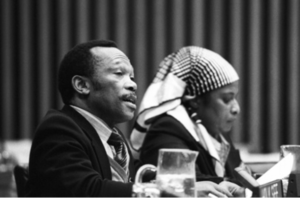
Image: https://africanactivist.msu.edu/record/210-849-32284/
Opportunity
Petitioning to the UN allowed revolutionaries to establish networks and receive resources. Since organizations often sponsored petitioners, this allowed them to broaden their network of US-based resources and to network within the organizations. In addition, the UN often heard testimonies from numerous people, allowing petitioners to meet each other if they had not already; these petitioners were often from different parties, perspectives, and movements. This image shows the first democratically elected president of Togo, Sylvanus Olympio, with a delegation from the American Committee on Africa in Togo. ACOA had helped Olympio when he was a petitioner at the UN seeking independence and formed relations with him.
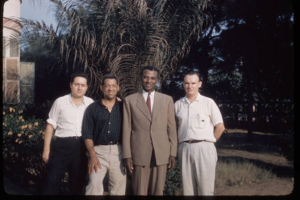
Image: https://africanactivist.msu.edu/record/210-849-31461/
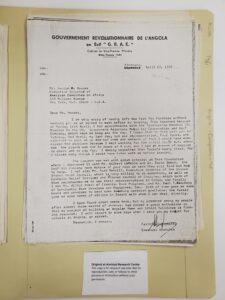
Image: 1967-11-13 Kounzika to Houser: speaking of opportunity in the US (African Letters Project database)
Special Committees
During decolonization, the United Nations created many committees to address country-specific situations. These were important for the recognition of liberation movements and tracking updates and progress in countries. There were committees such as The Special Committee on Portuguese territories; Special Committee of 24 on Decolonization; Special Committee against Apartheid; Committee to support the Republic of Guinea-Bissau; etc. This picture depicts Chairman Salim A. Salim of the Special Committee of 24 on Decolonization meeting with Amicar Cabral, Secretary-General of the Partido Africano Independencia da Guine e Cabo Verde (PAIGC). Established in 1961, the Special Committee 24, because of the number of members, reviewed the political, economic, and social situation in each of the remaining Non-Self Governing Territories on the UN list. The committee held meetings in several countries to discuss Southern Rhodesia, Namibia, and the African Territories under the Portuguese administration.
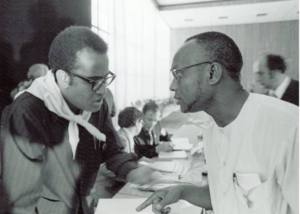
Image: Ihttps://africanactivist.msu.edu/record/210-849-31357/
Emmanuel Kounzika
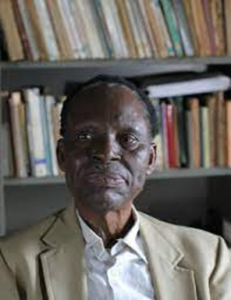
Image: https://www.tchiweka.org/pessoas/emmanuel-kunzika
Emmanuel Kounzika petitioned the UN for the first time in 1962. Kounzika was the leader of the Democratic Party of Angola and then became Vice-Premier of the National Liberation Front of Angola (FNLA) and Revolutionary Government of Angola in Exile (GRAE). He focused his efforts on Angolan refugees in the Congo and petitioned the Special Committee on Portuguese Territories. While he focused mainly on social services for refugees, he was an essential political representation for the Zombo people, with whom his political party identified. He spoke of the Portuguese administration’s continued use of forced labor, the longevity of the oppressive Portuguese colonial rule, and updates on the liberation movements involved. This United Nations document of the official record of this meeting states the overall points made and the revolutionaries that spoke, such as Kounzika, Holden Roberto, many refugees, etc.
